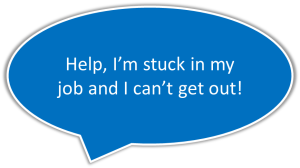Quitting
Two Tips For When You Feel Stuck at Your Job
 When you feel stuck in a job, you can get tunnel vision that focuses on what isn’t working.
When you feel stuck in a job, you can get tunnel vision that focuses on what isn’t working.
When you feel trapped because your salary pays the bills and provides health insurance, and gives you the means to support people who depend on you, it can seem like there aren’t very many good options. You may reject ideas about how to improve the situation or not have any ideas in the first place.
When you’re working in a job that isn’t right for you, it is draining. It is typical to feel overwhelmed and exhausted. On top of that, if you’ve been in an environment where you’ve been frequently criticized and your contributions haven’t been valued, it is common to lose confidence in your abilities.
I’ve had people tell me that they were so discouraged at work that they actually preferred being at home sick with the flu to going to the office!
This isn’t a good emotional state to begin creating a better job or work environment! But the truth is that there are many possible ways to improve work situations. It is just harder to access those possibilities when your perspective is narrowed by fear and discouragement.
One way to remind yourself that you do have options is to make a list of all the ways that your work situation can improve. This is a brainstorming-style list designed to open your mind, so including things that don’t seem realistic is actually a good idea. Things like, “My boss gets fired and a great new manager takes over the department,” or “A friend at another company recruits me to join his staff.” Or even, “I quit my job and go back to school to become a naturopathic doctor.”
If you are more visual and prefer not to write lists, mind-mapping is a great exercise. Take a blank piece of paper and jot down a single word or short phrase that represents what you’re ideal job situation would be. Then draw lines to connect the words that have common themes, and soon you’ll see patterns emerge.
Lists and mind-mapping are great ways to broaden your perspective when you feel stuck. These exercises tap into the part of your brain that has unique ideas and flashes of insight. In the short-term, taking these actions can boost your attitude by reminding you that there are many possibilities to improve your job situation. Then, with a more open mind, you might decide to pursue one of your ideas or discover a new opportunity that you might not have seen before.
Might as well deal with your stuff now
If you use work to avoid what else in your life isn’t working and then you quit, or get laid off, or take a new job that doesn’t demand twelve hour work days, all of a sudden you’re going to be confronted with that stuff.
If you are so busy and distracted with work and your other obligations that you don’t notice all that stuff that you’ve been avoiding, it will be front and center in your life as soon as you have more time.
Think of all the people around you who complain about being too busy. Maybe you are one of them. If you weren’t too busy, then what would you complain about?
Your stuff will eventually catch up to you. When you start having more time, you have more time to think about damaged relationships, health concerns, financial chaos, or dreams that you put aside. Then what?
It can feel like doom and gloom, but it is actually an opportunity to get more of what you want in life. A little effort over a sustained period of time is how any great achievement is earned. Relationships can be repaired, greater health can be achieved, finance goals can be set, and dreams can evolve.
Might as well start now.
Still Using Your Company Email Address for Personal Business?
![]() Last week Microsoft announced another 3,000 layoffs. The news inspired me to check out the Mini-Microsoft blog that used to be a great gut-check of the view inside the company. It is largely inactive now, but as I scrolled past comments about the layoffs back in July, one of them caught my attention.
Last week Microsoft announced another 3,000 layoffs. The news inspired me to check out the Mini-Microsoft blog that used to be a great gut-check of the view inside the company. It is largely inactive now, but as I scrolled past comments about the layoffs back in July, one of them caught my attention.
The anonymous commenter had a great perspective. He acknowledged that while being laid off hurt, he was going to view it as an opportunity to discover what else he wanted to do. He closed by saying “I think it also may be healthy for me to not have my identity associated with my MS email address.”
Yes.
If you use your employer’s email address for your personal use, every time you hit “send”, you’re associating your personal identity with your place of employment. You’re signaling that you, as a person, are tied to your company even for personal matters.
If your identity is tied up with your employer, your job title, or the type of work you produce, it is smart to start building up your sense of yourself that is separate from work. This is a good thing to do anyway, but it is especially important if you’re about to leave a job. If you’re not prepared, you could slip into an identity crisis.
If you are using your work email address for personal business, make the change. Retrain your friends and family to use a personal address.
You are more than who you’re employed by.
If You Want to Quit Your Job in 2015, Check These Items Off Your List by December 31st
If you’re planning to quit your job in 2015, there are multiple things you can do before the end of the year to be better prepared.
Use your healthcare benefits. This is especially important if you’ve met your deductible for 2014, or are getting close. If you move to a new employer, your healthcare benefits may have higher deductibles or lower co-pays, or exclude the practitioners that you currently see.
Don’t forget the optometrist! Even if you have never worn glasses or contacts before, if your benefits include an eye exam, it is worth looking into (ha!). Or, if you have been wearing the same lenses for a long time, your vision might have changed. Many eye care benefits allow for one set of prescription glasses or contacts each calendar year. If you get new glasses now, you could also get prescription sunglasses or contacts in January.
My vision constantly gets better or worse. When I switched to private insurance, I no longer had optometrist benefits. Fortunately when I had benefits in the past, I got new glasses each year as my prescription improved or worsened, so now I can rotate through them as my sight changes.
Get your charitable donations matched. If your company has a charitable gift-matching program, take advantage of it by making your donations now.
If you can afford it, max out your employer-sponsored retirement saving plan. Got a 401(k), 403(b), 503(b), or another annualized retirement saving plan that your company matches? Most plans start over on January 1st. If you aren’t able to contribute the maximum limit, can you contribute enough to receive your employer’s highest matching amount? This is part of your earned compensation. Don’t leave it behind when you go.
If you’re trying to save money, consider taking less vacation time this holiday season so that you can cash it out when you quit. If you work for a company that is slow during the holidays, this can be a great time to be on the job anyway. It will be quieter and calmer, and you can work on the projects that are most important for you to accomplish before you leave. You can also use the extra privacy to print paystubs, retirement plan or stock details, and your past performance reviews.
Enjoy your holiday bonuses. If your employer gives cash bonuses or gifts in December, take an extra moment to savor them. To everyone else they are end-of-year extras. For you, they are your parting gifts.
Why it’s Smart to be Prepared to Leave Your Job on a Moment’s Notice
Whether you plan to quit your job now or never, it is smart to be ready to leave on a moment’s notice. It’s not about being fearful that you might lose your job. It’s about gaining confidence by being prepared.
Here’s why it’s important:
- Being ready to quit is like having a grab-and-go bag for your career. Tomorrow might be your last day at work whether you want it to be or not. Layoffs happen, businesses fail, companies relocate. Job security is more of a wish than a reality.
- You’ll be empowered. You’ll have options and will be less dependent on your employer to meet your financial needs and your personal career goals.
- You may be more successful at your job. Feeling that you can leave at any time, you might take smart risks that pay off. You might speak up more, and get more attention for your projects.
- You’ll be more agile. If you’re shoulder-tapped to transfer to a new role or new location, you can change gears quickly. Or you can say no and let the chips fall where they may, because you’re ready for it.
There are multiple components to being fully prepared that involve finances, health, shoring up support and more. If you don’t know where to start, take a look at your work tools. If you’re using a computer or cell phone provided by your employer, would you be ok if you were asked to hand them over tomorrow? If not, wipe all your personal photos, documents and data from your employer’s property. Stop using your company’s email address for personal communications. Make sure you have copies of your address book on your own computer and phone.
Another step is to make sure you’ve got copies of important information safely stored at home. This includes copies of your performance reviews and records of awards and achievements, so you can use that information to customize resumes in the future. It also includes having a portfolio of work samples that you can use in future interviews or as resources in your next role. Work samples could be snapshots of projects you worked on, non-confidential reports and presentations, or tangible materials that you produced. Make sure to take home financial documents like recent pay stubs and information about company-sponsored retirement plans and investments.
A third place to consider is your work space. Years ago my office was draped in personal belongings. I had two lamps, framed art on the walls, and a bookcase full of books, awards and photos. I even had hippie beads hanging from my door frame. (Don’t judge – people loved my office!) But when I left my office for the last time, I walked out with a single cardboard box of personal items. As I was working through my exit plan, I slowly swapped out the objects that were most important to me with fewer and more portable pieces. If you make this transition thoughtfully, nobody else will notice. But you’ll have the satisfaction of knowing you could hold your cardboard box in one hand while you use the other to wave ‘bye.
Stress is Not Mandatory
For most of my career I thought stress was unavoidable and therefore something I needed to simply accept. You know how it is in an office – the deadlines, the pressure, the politics – it’s always something.
It could be diminished by a relaxing vacation and it could be forgotten about when I was immersed in a good book, but stress was always present in one form or another.
Then I quit my job and realized I didn’t have to just accept it. After all, I quit that whole pile of job stress and walked away!
Of course as I changed my career I encountered new kinds of stress (I previously blogged about the difference in pressure being an entrepreneur vs. an employee). But this stress is much easier to deal with. Once I unplugged from the corporate machine, life slowed way down. Now instead of a constant flow of adrenaline, there are ebbs and flows. There is also a lot more space to deal with the tension, both in my days and in my brain.
Stress is not mandatory.
If They’re Not Cheering For You, Ignore Them
In my last few days at my old job when everyone knew I was leaving, my coworkers were great. They were glad for me, they admired my decision and many were wistful because they wished they were leaving, too.
Outside of the office, it was a different story. When I happily shared the news with friends, their responses were often negative. One pal’s reaction was “Oh no, I’m sorry.” And then, “Why did you do that?” This was a guy who had listened to me complain for years about how exhausted I was from working all the time, who knew that I wanted something better for my life.
They weren’t trying to be mean; they just didn’t understand why I would leave a steady job to go write for a month and launch a business. They were a little concerned about the risk I was taking but mostly they were reflecting their own fear.
They were unhappy in their careers but afraid to make changes. They projected their worries about what would happen if they didn’t have regular jobs. The uncertainty was too scary.
I was disappointed that these friends didn’t celebrate with me, but I understood why. I also understood that I didn’t have to listen to their doubts. The cheering section was much more fun!
Once You Decide to Quit Your Job, You Might Enjoy it More Than Ever
It is a phenomenon that I heard over and over from people who I spoke to about quitting their jobs. Once they decided on a specific date to resign, they started enjoying their work again.
Most of these people were waiting for an event several months in the future, like receiving an annual bonus, before they announced that they were leaving. So while they knew that they were on their way out, their coworkers and managers did not.
This secret changed the way they thought, felt and behaved at work. One woman who spent half a year planning to quit her law firm said, “Those were the best six months of my career.”
These are the reasons why deciding to quit made employees like their work again:
They spent more time with coworkers they cared about. They knew that they weren’t going to see them five days a week anymore and would miss them. They made a point to stop by their desks to chat, eat lunch together and enjoy their company while they still could.
They stood up for themselves. On the flip side of missing their friends, there were other coworkers that they were looking forward to never seeing again. Until then, instead of ignoring or downplaying passive-aggressiveness or behavior designed to humiliate them, they told the offenders that it wasn’t OK to treat them that way.
They took more risks. All those great ideas that were tamped down out of fear of failure suddenly had new potential. Instead of going along with their managers’ terrible business proposals, they pointed out how different approaches would generate better results.
They set boundaries. They stopped working late nights and went home for dinner. They put their smartphones down and spent their weekends with friends and family, having fun and relaxing.
They kept it in perspective. Instead of getting worked up about the crap their bosses said, their long commutes and inane company policies, they reminded themselves that in a very short time it wouldn’t be their problem any longer.
All of this adds up to taking their power back. They had a lot less to lose since they were on their way out and wouldn’t be around to be punished in the next annual review. They stopped being afraid and started prioritizing their health, relationships and happiness.
Wouldn’t it be great if employees treated themselves with this level of self-respect all the time, not just when they are about to quit?
Three Things to Do When You’re About to Get Laid Off
If you think you’re going to get laid off soon, there are a few things you can do right now to be better prepared.
Don’t wait until you get the news – you might be upset or angry and forget to take care of important details while you have the chance. And don’t be overconfident. Just because your company may have given workers weeks’ long grace periods in the past, you never know when the policy will change and you’ll be asked to pack up your office and leave in an hour.
- Copy your contacts from your work computer’s address file to your home computer. All those coworkers, vendors and partners whose phone numbers and email addresses you filed on your work PC are part of your professional network. Regardless of where your career goes, keep your “rolodex”. And those personal names and numbers you stored in your work address book for the dentist and the pet sitter – save yourself the steps of having to recreate that information later.
- Print your most recent paystub and your December 31st paystub. You might need the details for mortgages or refinancing, for taxes, or for anything that requires proof of past earnings. Also, when you’re considering new job opportunities you can refer back to your paystub to add up the non-cash components of your total compensation. Employer-matched 401K’s, life/health/disability insurance, gym memberships, bonuses and stock should all be taken into account when it is time to discuss salaries. Being able to talk in detail about the total value of your past compensation package will help you negotiate with confidence.
- Calm down. Yes, facing a layoff can be scary. Career changes are disruptive and one that is not your choice may have extra discomfort because of the uncertainty of what you’ll do next. When you get consumed by your thoughts, just stop. Take a deep breath. You were hired for your last job and you’ll be hired again. Or you’ll start your own business. Or retire. Or take a break and figure out what you really want to do with the next years of your life. You’ll be eligible for unemployment benefits and probably get severance pay, so don’t waste your energy panicking about a financial disaster that probably won’t materialize. This could be the best thing that ever happened to you.
Of course there are more things you can do before you walk out your company’s door for the last time. But for now, take these steps. And then go to work tomorrow knowing you’re a little more prepared. You got this.




Recent Comments